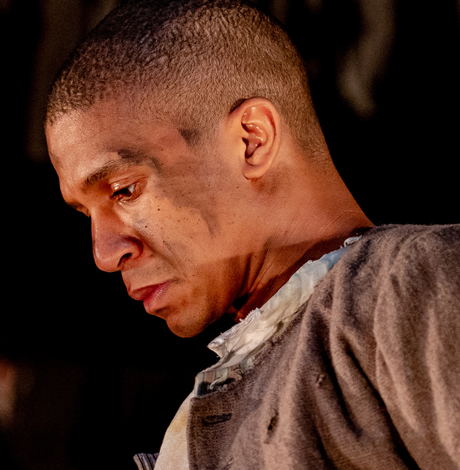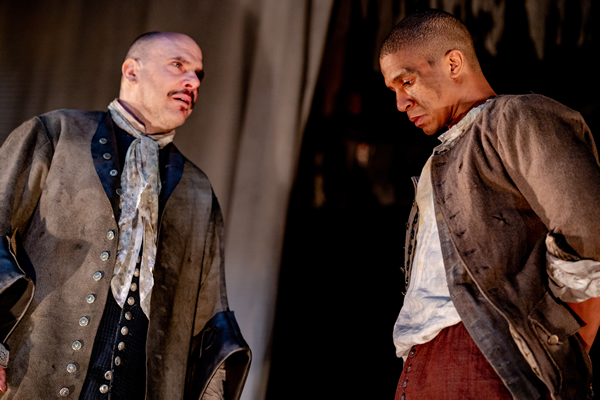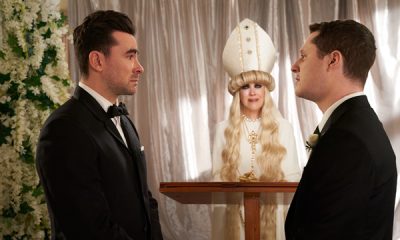Theater
FALL ARTS 2018 THEATER: ‘Macbeth,’ ‘King John’ and Kahn’s swan song
Iron Crow tackles ‘Laramie Project,’ Synetic offers ‘Sleepy Hollow’


Chris Genebach, on left, and Jaysen Wright in ‘Macbeth’ at Folger Theatre. (Photo by Brittany Diliberto; courtesy Folger)
The fall theater season is proving to be an exciting mix of classics, area premieres and some promising new works. And, like always, LGBT theater professionals are playing a big part in making it happen.
In memoriam of the 20th anniversary of Matthew Shepard’s death, Baltimore’s award-winning queer company Iron Crow Theatre (45 West Preston St., Baltimore) presents“The Laramie Project” through Sept. 23. With just eight actors playing about 60 characters, the seminal 2000 work weaves together interviews, journal entries and published news reports about the hate crime murder of the gay University of Wyoming student. It’s written by out playwright Moisés Kaufman and the members of Tectonic Theater Project and John Knapp directs. Full details at ironcrowtheatre.org.
Signature Theatre (4200 Campbell Ave., Arlington) continues with its season opener, an exquisite production of Stephen Sondheim’s “Passion” through Sept. 23. Set in 1860s Italy, Passion portrays the unlikely but intense relationship between a dashing young soldier and his commanding officer’s plain and ill-fated cousin Fosca. Out actor Claybourne Elder and Natascia Diaz give stellar performances. It’s beautifully staged by out director Matthew Gardiner.
Also, at Signature, out director Joe Calarco helms “Heisenberg” Sept. 18-Nov. 11. In this hit Broadway play, Simon Stephens (“The Curious Incident of the Dog in the Night-Time”) writes about a chance encounter on a London train that changes two people’s lives. Full details at sigtheatre.org.
Folger Theatre (201 E. Capitol St., S.E.) has kicked off the season with a wildly entertaining production of William Davenant’s Restoration era adaption of Shakespeare’s “Macbeth” (through Sept. 23). There’s a lot happening here: fabulous period music performed by the Folger Consort, expanded roles for the witches and Lady Macbeth, and lots of blood and flourish. What’s more, director Robert Richmond has opted to stage a play within a play and set the action in London’s notorious Bedlam asylum. The uniformly excellent large cast includes Ian Merrill Peakes in the title role and Kate Eastwood Norris as his wife. Also featured is out actor Jaysen Wright as an asylum inmate with PTSD who’s been cast to play Lenox
Next up at Folger, Aaron Posner directs Shakespeare’s epic royal power struggle, Shakespeare’s “King John” (Oct. 23-Dec. 2). The cast includes Kate Eastwood Norris as Philip the Bastard and out actor Holly Twyford as Constance. Full details at folger.edu/folger-theatre.
Taffety Punk (Capitol Hill Arts Workshop, 545 7th St., S.E.) presents Sadie Hasler’s dark comedy “Pramkicker” through Sept. 29. Find out what happens after a woman loses it in a café, kicks a pram and is then arrested and sent to anger management training. Details at taffetypunk.com.
At Mosaic Theater Company (Atlas Performing Arts Center, 1333 H St., N.E.) it’s “Marie and Rosetta,” running through Sept. 30. Geroge Brant’s terrific play with music takes a glimpse into the personal/professional relationship of gospel singer and rock and roll pioneer Sister Rosetta Tharpe and singer/pianist Marie Knight. It’s cleverly staged by Sandra L. Holloway with vibrantly memorable performances by Roz White and Ayana Reed. Full details at mosaictheater.org.
Woolly Mammoth Theatre Company (641 D St., N.W.) starts the season with “Gloria,” running through Sept. 30. Penned by Branden Jacobs-Jenkins, the 2016 Pulitzer Prize finalist centers on the cutthroat culture of the New York magazine world. The cast includes talented out actor Justin Weaks. Kip Fagan directs. Full details at woollymammoth.net.
Through Oct. 7, “South Pacific” runs at Olney Theater Center (2001 Olney-Sandy Springs Road, Olney, Md.). The Rodgers & Hammerstein’s timely classic about love, war and racism is directed by Alan Maraoka. Full details at olneytheatre.org.
Theater Alliance (Anacostia Playhouse, 2020 Shannon Pl., S.E.) opened the season with “The Events,” running though Oct. 7. Scottish playwright David Greig tells the story of Clare, the lone survivor of a mass shooting. Colin Hovde directs. Full details at theateralliance.com.
GALA Hispanic Theatre (3333 14th St., N.W.) is presenting the U.S. premiere of the romantic comedy “Como agua para chocolate (Like Water for Chocolate),” through Oct. 7. Adapted from the novel by Laura Esquivel, the play (performed in Spanish with English surtitles), is the story of a young woman trapped by traditions who finds freedom in cooking “so magical it inspires people to laugh, cry and burn with desire.” The cast includes Luz Nicolás and out actor Carlos Castillo. Full details at galatheatre.org.
Studio Theatre (1501 14th St., N.W.) enters fall with “If I Forget,” through Oct. 14. Written by Bethesda native Steven Levenson, it’s the story of a modern, D.C. Jewish family grappling with aging parents, Israel and real estate. Matt Torney directs. Full details at studiotheatre.org.
Ford’s Theatre (511 10th St., N.W.) presents “Born Yesterday” (Sept. 21-Oct. 21). Directed by Aaron Posner, this terrific satirical comedy about an opportunistic tycoon who arrives in 1940s Washington with his naive girlfriend to game the political system (sound familiar?). Kimberly Gilbert stars as Billie Dawn, the role that Judy Holliday made famous. Full details at fords.org.
The Klunch (D.C. Arts Center, 2438 18th St., N.W.) opens its season with the world premiere of “How to Win a Race War” (Sept. 21-Oct. 30). Written and directed by The Klunch’s out artistic director Ian Allen, the three-part comedy is “a parody of white supremacist ‘race war’ fiction, which has proliferated in the years since Timothy McVeigh named William Pierce’s “The Turner Diaries” as inspiration for his brutal 1995 bombing of a federal building in Oklahoma City.” (18 and older only). Full details at theklunch.com.
Shakespeare Theatre Company (Lansburgh Theatre, 450 7th St., N.W.) kicks off legendary out artistic director Michael Kahn’s final season with “The Comedy of Errors” (Sept. 25-Oct. 28). Staged by out director Alan Paul, the Bard’s madcap farce revolves around mishaps of two sets of twins, each with the same name. The top-notch cast includes out actors Sarah Marshall and Tom Story.
Later into STC’s season, Michael Kahn directs David Ives’ “The Panties, The Partner and The Profit: Scenes from the Heroic Life of the Middle Class” (Dec. 4-Jan. 6). Moving from Boston in 1950 to Wall Street in 1986 to lavish Malibu today, Ives’ funny new work is an adaption of Carl Sternheim’s epic trilogy, “Scenes from the Heroic Life of the Middle Classes.” Full details at shakespearetheatre.org.
Synetic Theater (1800 South Bell Street, Chrystal City) is set to give its movement-based interpretation of the spooky tale of Ichabod Crane and his encounters with the Headless Horseman in “Sleepy Hollow” (Oct. 3-Nov. 4). Details at synetictheater.org.
At Round House Theatre (4545 East-West Highway, Bethesda) Amber Paige McGinnis makes her directorial debut staging out playwright Paula Vogel’s magnificent “How I learned to Drive” (Oct. 10 – Nov. 4). The award-winning play heartbreakingly chronicles a woman’s attempt to break the silence and cycle surrounding sexual abuse. Ayssa Wilmoth Keegan stars as Li’l Bit. Details at roundhousetheatre.org.
Constellation Theatre Company (1835 14th St., N.W.) begins its “Epic Love” season with Elton John and Tim Rice’s “Aida” (Oct. 11- Nov. 18). Staged by out director Michael J. Bobbitt, the musical follows a love triangle involving Nubian princess Aida who’s been kidnapped from her country; Radames, the Egyptian captain who enslaved her people; and his fiancée Princess Amneris. Details at constellationtheatre.org.
At the National Theatre (1321 Pennsylvania Ave., N.W.) fall is filled with music — new and not so new. First, it’s “Beetlejuice” (Oct. 14-Nov. 18). Alex Timbers directs the pre-Broadway world premiere of this new musical comedy, based on Tim Burton’s quirky iconic film. After that, it’s the road show of the Tony Award-winning Broadway hit “Beautiful: the Carole King Musical” (Nov. 27-Dec. 30). Details at Thenationaldc.org.
At Theater J (offsite performance, Arena Stage, 1106 6th St., S.W.), it’s Anna Ziegler’s provocative new play “Actually” (Oct. 17-Nov. 18). Johanna Gruenhut directs this provocative new play about issues surrounding sexual consent at American colleges. The cast features Sylvia Kates and out actor Jaysen Wright. Details at Theaterj.org.
WSC Avant Bard (Gunston Arts, 2700 South Lang St., Arlington) presents the intriguing “Illyria, or What You Will,” a work freely adapted from Shakespeare’s “Twelfth Night” (Oct. 18-Nov. 19). Conceived by Jonelle Walker and Mitchell Hébert and directed by Hébert, the piece “reimagines Shakespeare’s comedy of mixed-signal love in a downtown Manhattan dive bar in the early 1980s, where identity, sex and gender are what you will.” The 11-person cast features out actors Christopher Henley and Frank Britton. Full details at wscavantbard.org.
The Kennedy Center presents “Anastasia” (Oct. 30-Nov. 25), a romantic musical by Lynn Ahrens and Stephen Flaherty about the fabled Grand Duchess Anastasia who may or may not have escaped execution during the Russian Revolution. Details at kennedy-center.org.
Arena Stage (1101 6th St., S.W.) presents “Anything Goes” (Nov. 2-Dec. 23). Staged by Arena’s artistic director Molly Smith, this Cole Porter comedy musical about love and hijinks on a New York to London bound luxury cruiser features — among many standards — “You’re the Top” and “I Get a Kick Out of You.” Corbin Blue plays young lovestruck Wall Street broker Billy Crocker. Full details at arenastage.org.
D.C.’s company dedicated to the LGBT experience, Rainbow Theatre Project (D.C. Arts Center, 2438 18th St., N.W.), presents “Jeffrey Higgins: A Deafening Sound (a cabaret)” (Nov. 23-24). Directed and performed by Higgins, it’s the exploration of a gay life through song. Details at rainbowtheatreproject.org.
Theater
‘Octet’ explores the depths of digital addiction
Habits not easily shaken in Studio Theatre chamber musical

‘Octet’
Through Feb. 26
Studio Theatre
1501 14th Street, N.W.
Tickets start at $55
Studiotheatre.org
David Malloy’s “Octet” delves deep into the depths of digital addiction.
Featuring a person ensemble, this extraordinary a capella chamber musical explores the lives of recovering internet addicts whose lives have been devastated by digital dependency; sharing what’s happened and how things have changed.
Dressed in casual street clothes, the “Friends of Saul” trickle into a church all-purpose room, check their cell phones in a basket, put away the bingo tables, and arrange folding chairs into a circle. Some may stop by a side table offering cookies, tea, and coffee before taking a seat.
The show opens with “The Forest,” a haunting hymn harking back to the good old days of an analog existence before glowing screens, incessant pings and texts.
“The forest was beautiful/ My head was clean and clear/Alone without fear/ The forest was safe/ I danced like a beautiful fool / One time some time.”
Mimicking an actual step meeting, there’s a preamble. And then the honest sharing begins, complete with accounts of sober time and slips.
Eager to share, Jessica (Chelsea Williams) painfully recalls being cancelled after the video of her public meltdown went viral. Henry (Angelo Harrington II) is a gay gamer with a Candy Crush problem. Toby (Adrian Joyce) a nihilist who needs to stay off the internet sings “So anyway/ I’m doing good/ Mostly/ Limiting my time/ Mostly.”
The group’s unseen founder Saul is absent, per usual.
In his stead Paula, a welcoming woman played with quiet compassion by Tracy Lynn Olivera, leads. She and her husband no longer connect. They bring screens to bed. In a love-lost ballad, she explains: “We don’t sleep well/ My husband I/ Our circadian rhythms corrupted/ By the sallow blue glow of a screen/ Sucking souls and melatonin/ All of my dreams have been stolen.”
After too much time spent arguing with strangers on the internet, Marvin, a brainy young father played by David Toshiro Crane, encounters the voice of a God.
Ed (Jimmy Kieffer) deals with a porn addiction. Karly (Ana Marcu) avoids dating apps, a compulsion compared to her mother’s addiction to slot machines.
Malloy, who not only wrote the music but also the smart lyrics, book, and inventive vocal arrangements, brilliantly joins isolation with live harmony. It’s really something.
And helmed by David Muse, “Octet” is a precisely, quietly, yet powerfully staged production, featuring a topnotch cast who (when not taking their moment in the spotlight) use their voices to make sounds and act as a sort of Greek chorus. Mostly on stage throughout all of the 100-minute one act, they demonstrate impressive stamina and concentration.
An immersive production, “Octet” invites audience members to feel a part of the meeting. Studio’s Shargai Theatre is configured, for the first, in the round. And like the characters, patrons must also unplug. Everyone is required to have their phones locked in a small pouch (that only ushers are able to open and close), so be prepared for a wee bit of separation anxiety.
At the end of the meeting, the group surrenders somnambulantly. They know they are powerless against internet addiction. But group newbie Velma (Amelia Aguilar) isn’t entirely convinced. She remembers the good tech times.
In a bittersweet moment, she shares of an online friendship with “a girl in Sainte Marie / Just like me.”
Habits aren’t easily shaken.
Theater
Out dancer on Alvin Ailey’s stint at Warner Theatre
10-day production marks kickoff of national tour

Alvin Ailey American Dance Theater
Through Feb. 8
Warner Theatre
513 12th St., N.W.
Tickets start at $75
ailey.org
The legendary Alvin Ailey American Dance Theater is coming to Washington’s Warner Theatre, and one of its principal veterans couldn’t be more pleased. Out dancer Renaldo Maurice is eager to be a part of the company’s 10-day stint, the kickoff of a national tour that extends through early May.
“I love the respectful D.C. crowd and they love us,” says Maurice, a member of esteemed modern dance company for 15 years. The traveling tour is made of two programs and different casting with Ailey’s masterwork “Revelations” in both programs.
Recently, we caught up with Maurice via phone. He called from one of the quiet rooms in his New York City gym where he’s getting his body ready for the long Ailey tour.
Based in North Newark, N.J., where he recently bought a house, Maurice looks forward to being on the road: “I enjoy the rigorous performance schedule, classes, shows, gym, and travel. It’s all part of carving out a lane for myself and my future and what that looks like.”
Raised by a single mother of three in Gary, Ind., Maurice, 33, first saw Alvin Ailey as a young kid in the Auditorium Theatre in downtown Chicago, the same venue where he’s performed with the company as a professional dancer.
He credits his mother with his success: “She’s a real dance mom. I would not be the man or artist I am today if it weren’t for the grooming and discipline of my mom. Support and encouragement. It’s impacted my artistry and my adulthood.”
Maurice is also part of the New York Ballroom scene, an African-American and Latin underground LGBTQ+ subculture where ball attendees “walk” in a variety of categories (like “realness,” “fashion,” and “sex siren”) for big prizes. He’s known as the Legendary Overall Father of the Haus of Alpha Omega.
WASHINGTON BLADE: Like many gay men of his era, Ailey lived a largely closeted public life before his death from AIDS-related complications in 1989.
RENALDO MAURICE Not unusual for a Black gay man born during the Depression in Rogers, Texas, who’s striving to break out in the industry to be a creative. You want to be respected and heard. Black man, and Black man who dances, and you may be same-sex gender loving too. It was a lot, especially at that time.
BLADE: Ailey has been described as intellectual, humble, and graceful. He possessed strength. He knew who he was and what stories he wanted to tell.
MAURICE: Definitely, he wanted to concentrate on sharing and telling stories. What kept him going was his art. Ailey wanted dancers to live their lives and express that experience on stage. That way people in the audience could connect with them. It’s incredibly powerful that you can touch people by moving your body.
That’s partly what’s so special about “Revelations,” his longest running ballet and a fan favorite that’s part of the upcoming tour. Choreographed by Alvin Ailey in 1960, it’s a modern dance work that honors African-American cultural heritage through themes of grief, joy, and faith.
BLADE: Is “Revelation” a meaningful piece for you?
MAURICE: It’s my favorite piece. I saw it as a kid and now perform it as a professional dance artist. I’ve grown into the role since I was 20 years old.
BLADE: How can a dancer in a prestigious company also be a ballroom house father?
MAURICE: I’ve made it work. I learned how to navigate and separate. I’m a principal dancer with Ailey. And I take that seriously. But I’m also a house father and I take that seriously as well.
I’m about positivity, unity, and hard work. In ballroom you compete and if you’re not good, you can get chopped. You got to work on your craft and come back harder. It’s the same with dance.
BLADE: Any message for queer audiences?
MAURICE: I know my queer brothers and sisters love to leave with something good. If you come to any Ailey performance you’ll be touched, your spirit will be uplifted. There’s laughter, thoughtful and tender moments. And it’s all delivered by artists who are passionate about what they do.
BLADE: Alvin Ailey has been a huge part of your life. Thoughts on that?
MAURICE: I’m a believer in it takes a village. Hard work and discipline. I take it seriously and I love what I do. Ailey has provided me with a lot: world travel, a livelihood, and working with talented people here and internationally. Alvin Ailey has been a huge part of my life from boyhood to now. It’s been great.
Theater
Swing actor Thomas Netter covers five principal parts in ‘Clue’
Unique role in National Theatre production requires lots of memorization

‘Clue: On Stage’
Jan. 27-Feb. 1
The National Theatre
1321 Pennsylvania Ave., N.W.
thenationaldc.com
Out actor Thomas Netter has been touring with “Clue” since it opened in Rochester, New York, in late October, and he’s soon settling into a week-long run at D.C.’s National Theatre.
Adapted by Sandy Rustin from the same-titled 1985 campy cult film, which in turn took its inspiration from the popular board game, “Clue” brings all the murder mystery mayhem to stage.
It’s 1954, the height of the Red Scare, and a half dozen shady characters are summoned to an isolated mansion by a blackmailer named Mr. Boddy where things go awry fairly fast. A fast-moving homage to the drawing room whodunit genre with lots of wordplay, slapstick, and farce, “Clue” gives the comedic actors a lot to do and the audience much to laugh at.
When Netter tells friends that he’s touring in “Clue,” they inevitably ask “Who are you playing and when can we see you in it?” His reply isn’t straightforward.
The New York-based actor explains, “In this production, I’m a swing. I never know who’ll I play or when I’ll go on. Almost at any time I can be called on to play a different part. I cover five roles, almost all of the men in the show.”
Unlike an understudy who typically learns one principal or supporting role and performs in the ensemble nightly, a swing learns any number of parts and waits quietly offstage throughout every performance just in case.
With 80 minutes of uninterrupted quick, clipped talk “Clue” can be tough for a swing. Still, Netter, 28, adds, “I’m loving it, and I’m working with a great cast. There’s no sort of “All About Eve” dynamic going on here.”
WASHINGTON BLADE: Learning multiple tracks has got to be terrifying.
THOMAS NETTER: Well, there certainly was a learning curve for me. I’ve understudied roles in musicals but I’ve never covered five principal parts in a play, and the sheer amount of memorization was daunting.
As soon as I got the script, I started learning lines character by character. I transformed my living room into the mansion’s study and hallway, and got on my feet as much as I could and began to get the parts into my body.
BLADE: During the tour, have you been called on to perform much?
NETTER: Luckily, everyone has been healthy. But I was called on in Pittsburgh where I did Wadsworth, the butler, and the following day did the cop speaking to the character that I was playing the day before.
BLADE: Do you dread getting that call?
NETTER: Can’t say I dread it, but there is that little bit of stage fright involved. Coming in, my goal was to know the tracks. After I’d done my homework and released myself from nervous energy, I could go out and perform and have fun. After all, I love to act.
“Clue” is an opportunity for me to live in the heads of five totally different archetype characters. As an actor that part is very exciting. In this comedy, depending on the part, some nights it’s kill and other nights be killed.
BLADE: Aside from the occasional nerves, would you swing again?
NETTER: Oh yeah, I feel I’m living out the dream of the little gay boy I once was. Traveling around getting a beat on different communities. If there’s a gay bar, I’m stopping by and meeting interesting and cool people.
BLADE: Speaking of that little gay boy, what drew him to theater?
NETTER: Grandma and mom were big movie musical fans, show likes “Singing in the Rain,” “Meet Me in St. Louis.” I have memories of my grandma dancing me around the house to “Shall We Dance?” from the “King and I” She put me in tap class at age four.
BLADE: What are your career highlights to date?
NETTER: Studying the Meisner techniqueat New York’sNeighborhood Playhouse for two years was definitely a highlight. Favorite parts would include the D’Ysquith family [all eight murder victims] in “A Gentleman’s Guide to Love & Murder,” and the monstrous Miss Trunchbull in “Matilda.”
BLADE: And looking forward?
NETTER: I’d really like the chance to play Finch or Frump in Frank Loesser’s musical comedy “How to Succeed in Business Without Really Trying.”
BLADE: In the meantime, you can find Netter backstage at the National waiting to hear those exhilarating words “You’re on!”




















